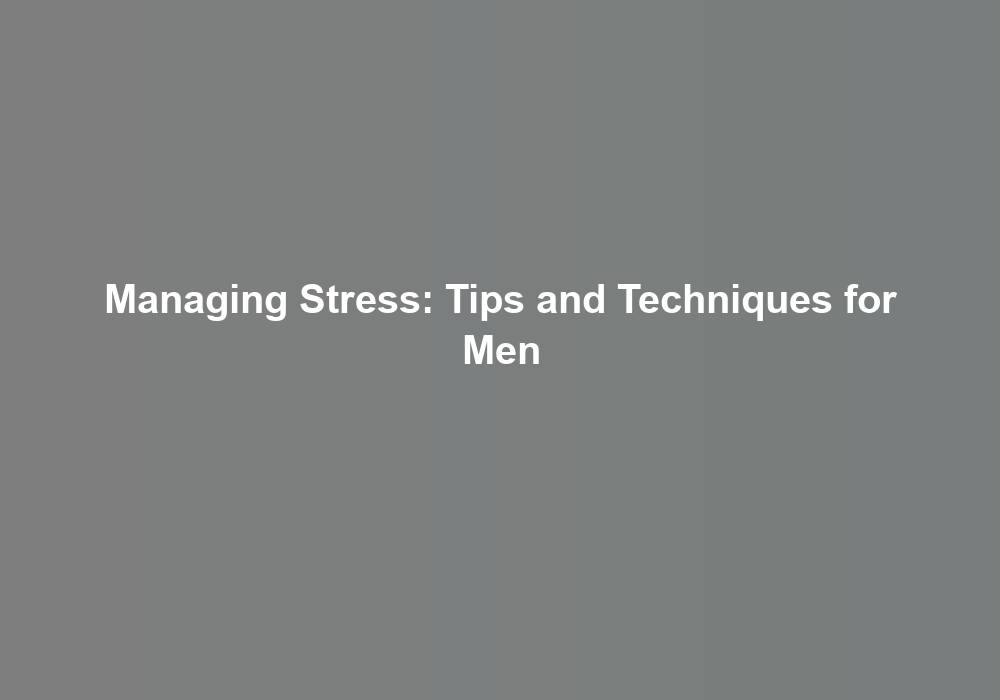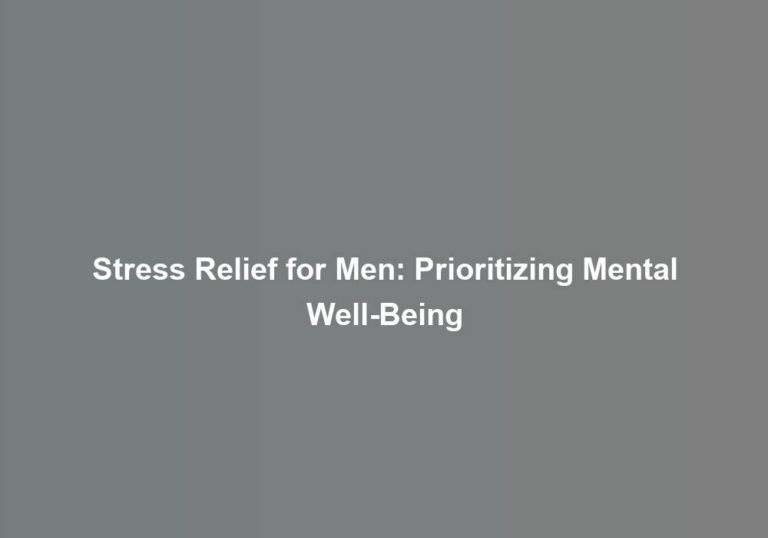Managing Stress: Tips and Techniques for Men
Feeling stressed, but hesitant to seek help? As a man, youG??re often expected to be the pillar of strength, yet the pressures of modern life can take a toll on your well-being. The struggle to manage stress is a common experience, and itG??s important to acknowledge that itG??s okay to seek out strategies and support. The techniques and tips weG??re about to explore can offer you practical ways to navigate and alleviate the stress you may be facing.
Understanding Male Stress Triggers
Understanding the triggers of stress in men can help you identify and manage the factors that contribute to your overall well-being. ItG??s important to recognize that stress affects everyone differently, and as a man, you may experience stress in unique ways. Identifying stressors specific to men is crucial in developing effective coping mechanisms. From societal expectations to workplace pressures, men often face distinct challenges that can lead to stress.
In todayG??s fast-paced and demanding work environments, workplace stressors can significantly impact men. Striving to balance career success with personal life, while also conforming to traditional male stereotypes, can create a breeding ground for stress. Understanding these pressures and how they manifest in your life is the first step in managing them effectively.
Moreover, men may respond to stress in ways that are different from women. ItG??s essential to recognize and understand your emotional responses to stress, whether itG??s anger, frustration, or withdrawal. By acknowledging these emotions, you can begin to address them in a healthy manner.
When it comes to coping strategies, men may benefit from male-specific approaches. Building a support network of other men who understand your experiences can provide a sense of belonging and validation. Engaging in physical activities, such as sports or exercise, can also be a powerful way to manage stress. Additionally, developing strong communication skills and seeking professional help when needed are essential components of male-specific coping strategies. Remember, you are not alone in this journey, and there are effective ways to manage and overcome male stress triggers.
Incorporating Physical Activity
Incorporating physical activity into your daily routine can significantly help in managing and reducing stress. Engaging in outdoor workouts and team sports can be especially beneficial for your overall well-being. HereG??s a simple guide to help you integrate physical activity into your life.
| Outdoor Workouts | Team Sports | Benefits |
|---|---|---|
| Hiking | Basketball | Increases endorphin levels |
| Cycling | Soccer | Enhances social connections |
| Running | Volleyball | Reduces anxiety and tension |
| Swimming | Tennis | Improves mood |
| Yoga in the park | Softball | Builds teamwork skills |
Spending time in nature while engaging in physical activities like hiking, cycling, or running can provide a calming effect and a sense of rejuvenation. Team sports, such as basketball, soccer, and volleyball, not only offer physical benefits but also foster a sense of camaraderie, which can help reduce stress and improve your mood. The release of endorphins during physical activity can act as a natural stress reliever, promoting a sense of well-being. Additionally, participating in team sports can enhance your social connections, providing a support system that can be crucial for managing stress.
Incorporating outdoor workouts and team sports into your routine can help you find balance, reduce stress, and improve your overall mental health. So, lace up your sneakers, grab a friend, and start reaping the stress-busting benefits of physical activity today!
Cultivating Healthy Coping Mechanisms
Feeling overwhelmed is a common experience, but there are healthy coping mechanisms that can help you manage stress. Incorporating breathing exercises, physical activity, and mindfulness practice into your daily routine can provide you with effective tools to navigate challenging situations. These techniques can help you build resilience and maintain a sense of calm amidst lifeG??s inevitable stressors.
Breathing Exercises
To manage stress, consider incorporating breathing exercises into your daily routine as a healthy coping mechanism. Deep breathing and relaxation techniques can help calm your mind and body, reducing the impact of stress on your overall well-being. Here are three simple yet effective breathing exercises you can try:
| Exercise | Steps | Duration |
|---|---|---|
| 4-7-8 Technique | Inhale for 4 seconds, hold for 7 seconds, exhale for 8 seconds | 4-8 cycles |
| Belly Breathing | Place one hand on your chest and the other on your belly, inhale deeply through your nose, and feel your belly rise as you breathe in and fall as you breathe out | 5 minutes |
| Box Breathing | Inhale for 4 seconds, hold for 4 seconds, exhale for 4 seconds, and wait for 4 seconds before breathing in again | 5-10 minutes |
Incorporating these exercises into your daily routine can provide a sense of calm and help you better manage stress.
Physical Activity
As you explore healthy coping mechanisms, consider how physical activity can complement breathing exercises in managing stress and promoting overall well-being. Engaging in regular physical activity is a powerful way to improve endurance and build strength, both of which are crucial for managing stress. Whether itG??s going for a brisk walk, hitting the gym, or practicing yoga, physical activity can help release built-up tension and clear your mind. It also promotes the release of endorphins, which are natural stress fighters. By incorporating physical activity into your routine, you not only enhance your physical health but also boost your mental resilience. Remember, finding an activity you enjoy is key to making it a sustainable part of your stress management plan.
Mindfulness Practice
Consider incorporating mindfulness practice into your daily routine as a powerful tool for cultivating healthy coping mechanisms and managing stress effectively. Mindfulness meditation can help you stay present, calm, and centered, even in the face of lifeG??s challenges. By practicing mindfulness, you can train your mind to focus on the present moment, reducing the impact of stress and anxiety on your overall well-being. Here are some stress reduction techniques to incorporate mindfulness into your daily life:
- Start with just a few minutes a day.
- Focus on your breath and bodily sensations.
- Notice your thoughts without judgment.
- Practice gratitude and self-compassion.
Prioritizing Work-Life Balance
Hey there, itG??s important to remember that prioritizing work-life balance is crucial for managing stress. By practicing effective time management, you can create a schedule that allows for both work and personal time. Setting boundaries and learning to say no when needed can also help you maintain a healthy balance between work and life.
Time Management
Finding the right balance between your work and personal life can be a challenging but essential aspect of managing stress as a man. Time management is crucial in achieving this balance. Here are some helpful tips to improve your time management skills:
- Prioritize tasks based on urgency and importance
- Create a schedule that allocates specific time for work, family, and personal activities
- Learn to delegate tasks when necessary to avoid feeling overwhelmed
- Set boundaries to protect your personal time and prevent work from encroaching on it
Setting Boundaries
To prioritize your work-life balance and manage stress effectively, itG??s important to establish clear boundaries between your professional and personal life. Asserting boundaries is crucial for maintaining personal space and preventing work from encroaching on your personal time. Start by communicating your needs to your colleagues and supervisors. Set specific times when you are available for work-related matters and stick to them, while also making it clear when you are off the clock. Additionally, avoid checking work emails or taking calls during your personal time unless itG??s absolutely necessary. By doing so, you create a healthy separation between your professional and personal life, allowing yourself the necessary time and space to recharge and enjoy your personal activities. Remember, setting boundaries is essential for achieving a balanced and fulfilling life.
Building Strong Support Networks
One of the most effective ways to manage stress is by building a strong support network around you. You donG??t have to face lifeG??s challenges alone; having a solid support system can provide comfort, encouragement, and practical help when you need it most. Here are some key ways you can build and strengthen your support network:
-
Friendships: Cultivate meaningful friendships with people who uplift and understand you. Spending time with friends can provide a sense of belonging and joy, and itG??s a great way to take a break from daily stressors.
-
Social Connections: Engage in social activities that interest you. Whether itG??s joining a sports team, hobby group, or volunteer organization, being around like-minded individuals can offer a sense of camaraderie and support.
-
Emotional Support: Seek out individuals who are good listeners and offer empathy. Being able to share your thoughts and feelings with someone who truly cares can lighten the emotional load and provide valuable perspective.
-
Community Involvement: Get involved in your community through local events, religious organizations, or charity work. Contributing to a cause larger than yourself can foster a sense of purpose and connection.
Building a strong support network takes time and effort, but the benefits are immeasurable. Remember, itG??s okay to lean on others during challenging times, and in turn, be there for them when they need support as well.
Embracing Mindfulness Practices
Consider incorporating mindfulness practices into your daily routine to help reduce stress and improve your overall well-being. Mindfulness meditation, in particular, has been shown to be a powerful tool for managing stress and enhancing mental clarity. By practicing mindfulness, you can learn to be fully present in the moment, acknowledge and accept your feelings, and approach challenging situations with a sense of calm and clarity.
One of the key benefits of mindfulness meditation is its ability to reduce the bodyG??s stress response. When you engage in mindfulness practices, you can lower your heart rate, decrease muscle tension, and regulate your breathing, all of which can help alleviate the physical symptoms of stress. Additionally, mindfulness can help you cultivate a greater sense of self-awareness, allowing you to recognize stress triggers and address them more effectively.
Incorporating mindfulness into your daily routine doesnG??t have to be complicated. You can start with just a few minutes of mindfulness meditation each day, gradually increasing the duration as you become more comfortable with the practice. Whether itG??s through guided meditation sessions, deep breathing exercises, or simply taking a few moments to focus on your surroundings, there are various stress reduction techniques that can be easily integrated into your daily life.
Conclusion
YouG??ve made it through the article on managing stress, and now itG??s time to put these tips and techniques into practice. Remember, just like a well-oiled machine, your body and mind need regular maintenance to function at their best. By incorporating physical activity, healthy coping mechanisms, and mindfulness practices into your daily routine, you can better navigate the stress triggers that life throws your way. Embrace these tools and take charge of your stress management journey. YouG??ve got this.







